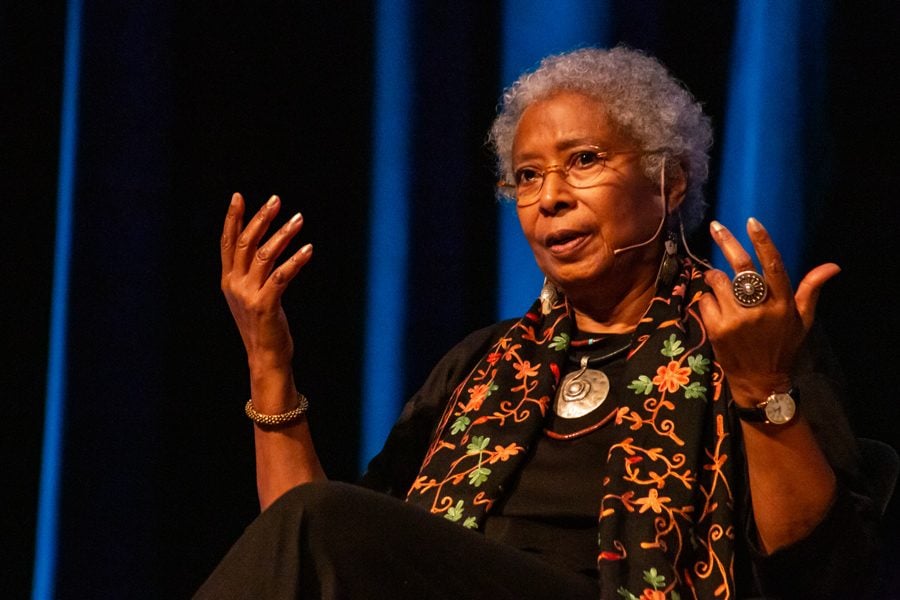Alice Walker says culture of individualism needs to change
Source: Ben Gonzales/Chicago Humanities Festival
Alice Walker addresses students and Chicago locals at a Chicago Humanities Festival event. Walker said destruction is compounded by partisan noise and mass media portrayals of outspoken individuals.
October 28, 2018
Alice Walker crossed borders and learned new languages to write her new book “Taking the Arrow Out of the Heart.”
But whether she’s in Evanston, North Dakota or Mexico, her message remains the same: “Be true to whoever you are.”
The Chicago Humanities Festival celebrated the arts this Sunday with a panel discussion at Cahn Auditorium featuring Walker, a Pulitzer-Prize winning author and celebrated activist. The Dolores Kohl Education Foundation and CHF organized the event and honored Walker with the 2018 Kohl Education Prize.
Parneshia Jones, winner of the Midwest Book Award — awarded annually for excellence in writing in the region — and sales and community outreach manager at Northwestern University Press, moderated the discussion. She began by asking what motivated Walker’s new collection of poems.
“Planetarily, we have an arrow in the heart,” Walker said. “This is no Cupid’s arrow — Earth is in its final decades.”
Walker said nature faces a myriad threats today: the displacement of indigenous communities, the slaughter of wildlife, climate change and war.
She said the destruction is compounded by partisan noise and mass media portrayals of outspoken individuals.
“What our culture needs more than anything is silence — we can’t grow in all the noise,” Walker said. “We figure out what we are here to do in the quiet.”
Walker said the solution to the unending commotion is caring. Part of the issue is selfishness — people care about improving their own lives but rarely put their problems in perspective, she said.
Walker said as a young writer, she formed a sisterhood with other black, female authors. They helped her reject the culture that pits women against each other.
“The establishment will choose one black person and try to clone that person through generations,” she said. “We were refusing to be chosen.”
Walker urged audience members to diversify the perspectives they drew from, noting the great loss that the historical underrepresentation of black female writers represents. Walker said without hearing the female perspective, one cannot understand the complexity of the issues that are affecting the world.
For students, Walker emphasized the importance of reflection. She said it’s normal to think a lot about one’s purpose in life, and it’s good to explore that.
Second year doctoral student Ramya Gurunathan said Walker’s advice was practical and timely.
“She gave a lot of nice takeaways as we start our careers,” Gurunathan said. “How to practice empathy, be thinking of others and how to work toward your own success but not at the expense of others.”
As an avid reader of Walker’s works, Medill freshman Imani Harris said Walker’s advice about being true to oneself is particularly important. She said reading Walker’s works made her fully recognize and value the hidden and important ways that black women use art to cope with social traumas.
“As a black woman who has always been interested in writing, Alice Walker’s books made me understand that it’s okay to write from my experience and appeal to people that look like me,” Harris said. “I don’t have to write for a white audience.”
Walker said that what makes writing truly matter is its effect. Without spirit, she said, writing doesn’t go anywhere.
“Art is something that helps us grow,” Walker said. “It doesn’t have to be pretty—it’s a tool to change the world.”


